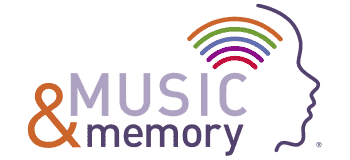 It all started with an email, nearly two years ago, when Heather Holmes was a recreational therapist, working toward her master’s while employed at the Good Samaritan Society’s care facility in Millard, Nebraska, on the west side of Omaha.
It all started with an email, nearly two years ago, when Heather Holmes was a recreational therapist, working toward her master’s while employed at the Good Samaritan Society’s care facility in Millard, Nebraska, on the west side of Omaha.
Of the hundreds of emails she received daily, this one piqued her curiosity. A New York-based non-profit called Music & Memory was offering a new webinar program to train nursing home professionals how to use iPods to create a personalized music program for residents. Holmes was taking a course in grant writing, and after doing some research about the program, decided this seemed like a perfect project to exercise her new skills.
Her grant application was successful, and Good Samaritan Society-Millard become one of the first elder care centers in the U.S. to be certified as a Music & Memory facility in fall 2011.
Enough iPods for Every Resident
Now the 103-bed skilled nursing and rehabilitation center, one of 240 communities in Good Samaritan’s national network, has achieved another first: Thanks to Holmes’s dedication, supportive leadership and colleagues, and a generous gift from a private donor, Good Samaritan Society-Millard has enough iPods for every resident in the facility—100 percent access.
“When I found out about the donation, I thought, wouldn’t it be great if everyone could have one,” says Holmes. “Our leadership was totally on board. They fully supported the program, thought it was innovative and said ‘go for it.’”
It took about a year to acquire all the iPods. Holmes says the program is gaining momentum as more and more residents try out the personalized music and “take ownership.”
Any resident who wants an iPod may have one. Currently, about a third of the community’s residents are participating in the program, including most of those who are severely impaired by dementia, Alzheimer’s and other cognitive challenges. The decision to have an iPod is totally up to the resident and his or her family, if the individual cannot express a preference.
Building Buy-in to Personalized Music
Those who are more independent, says Holmes, frequently approach staff with specific requests for music, from a recording of a beloved opera star to one of a favorite Spanish pop group. They often wear their headphones to meals in the common dining hall, provoking inquiries from other residents.
Expanding the personalized music program is a top priority. As Director of Recreational Therapy and Activities, Holmes now manages a team of two additional recreational therapists and an activities specialist. Each week and month, the team reviews residents’ playlist needs to update or refresh their collections. Among her efforts to fully integrate the program into the community’s culture, Holmes has made presentations at all-staff meetings about the benefits of personalized music, worked with admissions to include questions about musical interests during intake, explained the program to the Resident’s Council and taught nursing aides how to use and manage the iPods.
The Magic Key that Unlocks Memory
Her team has also integrated the iPods into “sensory boxes,” which are used in small groups of three to four residents with dementia who are very withdrawn and have difficulty communicating. The Beach Box, for example, includes sand to touch, images of the beach and iPods loaded with beach music that group members can listen to on headphones. Other sensory box themes include babies, weddings and Elvis Presley.
“We create an experience, and all of a sudden, someone in the group will have a moment when they speak five or six words—like ‘I remember dancing at my wedding,’” says Holmes. “For that minute, it’s like you’ve found a magic key to unlock their memory.”
All staff document the use and impact of iPods as part of their daily reporting. Consistent with what other professionals have observed in Music & Memory certified facilities nationwide, Holmes notes that residents often become calmer and more cheerful when listening to their own music. She says the music can curb difficult behavior, help residents fall asleep and take the place of pain medications.
Educating Future Recreational Therapists About the Benefits of Personalized Music
Holmes doesn’t stop with her colleagues at Good Samaritan when it comes to promoting the benefits of personalized music. She teaches a recreational therapy interventions course at the University of Nebraska-Omaha; in the lesson on person-centered programs, she always shows the Music & Memory video of Henry, which inevitably prompts a rich discussion afterwards.
It makes a strong impression on the students. “I always include a question about Henry on my mid-term exam,” says Holmes. “And people always remember. Music has played into many final presentations, as well.”
With Holmes as an inspiring role model, there’s every good chance those newly minted recreational therapists will carry a commitment to personalized music well beyond the classroom. And with good reason. Back at Good Samaritan-Millard, Holmes is well on her way, with the enthusiastic support of leadership and colleagues, to creating the nation’s first comprehensive, full-participation, personalized music program in an elder care facility.
Photo Credit: photosteve101 via Compfight cc
Want to bring personalized music to residents in your care facility? Please download Music & Memory’s free guide, Making the Case for Personalized Music: A Guide for Elder Care Professionals.
Founded in 2010, Music & Memory® is a non-profit organization that brings personalized music into the lives of the elderly or infirm through digital music technology, vastly improving quality of life.
